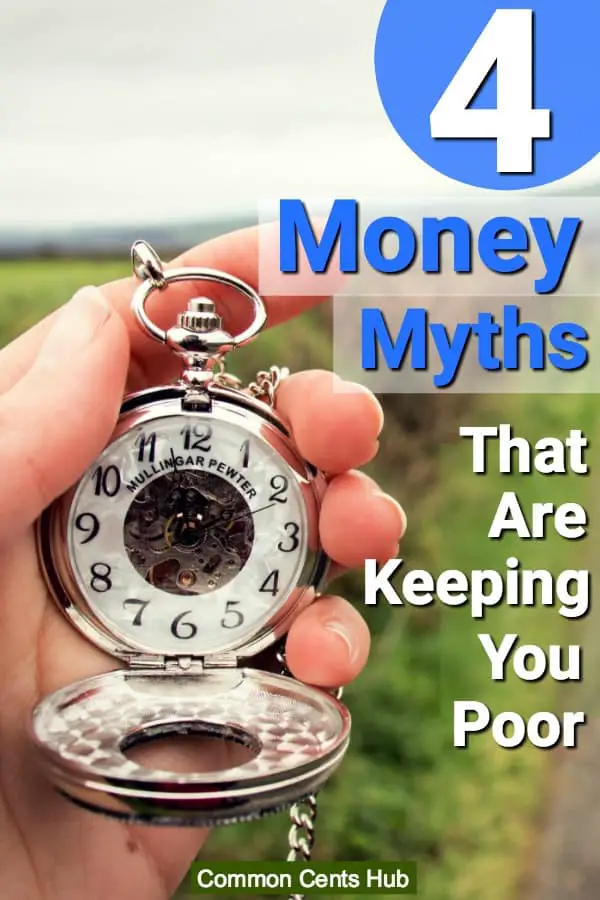“This post may contain affiliate links. Please read my disclosure for more info.
 Money myths are those choices we make that seem right at the time, but soon after, leave us wondering why we’re broke. Money myths may not even be apparent for a long time.
Money myths are those choices we make that seem right at the time, but soon after, leave us wondering why we’re broke. Money myths may not even be apparent for a long time.
When there always seems to be more month than money, and cutting back on every small joy in life isn’t cutting it, then you may have fallen for a money myth.
They’re those choices we make because our brother, our coworker, or our friend or even most other people do, so we assume it’ll also work for us.
It’s one thing to get a haircut, or a coat because it looked good on your coworker, and then realize it just doesn’t work for you.
But making long-term money decisions based on what worked for other people could cause you to struggle for decades.
When it comes to money, we need to do what’s right for us at any given time.
So here, we’ll go over four of the top money myths. These are choices that may have been right for your parents, or your friend, but maybe not for you.
Table of Contents
The Top 4 Money Myths
Money Myth #1 – Buying a home is always better than renting.
For decades, we’ve heard that buying a home is an investment. And for a long time, it was. My parents were lucky enough to buy a home in the sixties for $29k, and sold it in 2004 for $550k.
But anyone who owned a home four years later, saw it’s value take a nosedive. Owning your own place is nice, but it shouldn’t be counted on to be a cornerstone of your retirement plan.
So how do you know which is right for you – renting or owning?
There’s the lifestyle consideration:
If you plan to stay in the area, and you like the idea that you can settle in over time and transform a house into your family home, then buying a house might make sense.
But if you’re too busy to worry about yard work, and would rather pick up the phone and call someone to make a repair, then maybe renting fits your lifestyle.
And then there’s the money part:
Before even considering buying a house, have a clear understanding of your monthly budget. Relying on someone else to ‘pre-qualify’ you is dangerous.
Once you get an accurate estimate of the mortgage and taxes, also consider:
- What are the typical utility costs?
- Are you carrying other debt? Will your new home payment impact your ability to eliminate that debt?
- Can you afford the expenses and still contribute to an emergency fund? You’ll need it.
- Don’t sacrifice contributions to your retirement plan in favor of house payments.
- Consider how much discretionary income you’ll have. Will you be able to gradually do the improvements you want? Will you be ok stretching them out over several years?
You don’t want to get caught in a “house poor” condition, where your expenses are so high that the rest of your life comes to a halt. It’s nice being able to turn a house into your home, but things like fencing, new flooring and appliances aren’t cheap.
I remember going out shortly after buying my first home to get replacement knobs for the kitchen cabinets. “They can’t cost much, they’re so small”, I thought. Well, they came to around $150! Home Depot can easily become what was once your social life.
There are ways to ease into home ownership, like leasing with an option to buy, or buying a two-family home and having your tenant help with the mortgage.
So our first money myth is that home ownership is always better than renting. It might make sense for you, but it has to fit your lifestyle, and it also has to fit your budget after you pay yourself each month.
Related Topics:
- 8 Ways Your Budget May Not Be Working – And How to Fix it
- How to Build an Emergency Fund When You Don’t Have the Money
- Personal Capital – View All Your Accounts Together – for FREE
- How We Save $115/Month by Cutting Cable – And Still Watch the Same Shows
- Easy Steps to Start Your Own Profitable Blog
Money Myth #2 – My Partner Manages Our Budget, so I Don’t Interfere
A strange dynamic can happen when a couple manages their money. Many times, one person will take the initiative to balance the checkbook and manage the budget. And maybe it works out ok for awhile.
But just like someone’s character trait can be appealing initially, and then over time, bug the sh*t out of you, the same can happen with a couple’s money management.
Whoever is managing the budget takes on the stress of always being the gatekeeper. It becomes frustrating, especially if the person not managing the budget is more of a free spender.
And the person not managing the budget can feel resentful when their only discussion of money is when they need to justify an ATM withdrawal or a purchase.
Regardless of who manages the budget, it’s best to have a short, regularly scheduled budget meeting once a week. Nothing formal, just a fifteen minute talk about how you did this week, whether you’re on track for the month, and any irregular expenses coming up for the week.
It’s just kind of a strategy meeting to make sure you’re on the same page. Make it something to look forward to by having it over a bottle of wine or a few beers. Keep it short, and do something fun afterwards.
Here’s another reason a short weekly budget meeting can help:
It’s common for two people to have different spending philosophies. So common, that it’s one of the biggest areas of friction in a relationship. One way to try and head that off, is to discuss and reach agreement on a mutual long-term plan (like 5 years).
If you’re in agreement on your bigger goals, then it’ll be easier to see eye to eye on the smaller ones. Your weekly budget meeting can be a good way to just check in. It’s more of an exchange of information and a mutual pep talk, rather than an inquisitor and a defendant.
What you can do:
Whether you’re living paycheck to paycheck or not, set aside a regular time to sit down together each week. Talk about your mutual plan for the next several years. Do you plan a career change? Start a family? Move to another area? Retire?
Once you’re in agreement on your long term plan, then the short weekly meetings will be a low pressure way to ensure you’re both on the same page.
Money Myth #3 – I’ll Always Have a Car Payment – It’s Just a Given
I remember buying my first new vehicle, a Toyota 4×4 pickup. What a feeling it was, to finally drive a vehicle where I didn’t need to keep a case of oil in the trunk, or put plywood over the rusted floor. It felt like an accomplishment, or a milestone. Like I was finally getting somewhere.
But I was also living in a tiny attic apartment, and had no savings account. My employer offered a 401k with a company match, and I hadn’t joined yet because I “couldn’t afford the deduction“. I had no emergency fund, and was scraping by on my measly paycheck.
I fell for one of the worst money myths. I hadn’t realized yet, that there’s a difference between having the money for a car payment, and being able to afford a car payment.
It’s such an easy trap to fall into – forgetting that we need to always pay ourselves first. It seems so simple, but committing to years of debt payments, is why so many of us can’t afford to retire.
You’ve probably heard that buying things that depreciate is one of the worst ways to spend money. And new cars sink in value faster than almost anything you can buy.
But the real damage is the opportunity cost. According to Dave Ramsey, one third of new car payments average $475 per month. Think of what else could you do with that $475 each month.
If you invested it into a decent mutual fund with a 12% rate of return, you’d have over $100,000 in 10 years! After 20 years, you’d have $470,000. And at 30 years, you’d have $1.6 million!
That new car feeling isn’t all it’s cracked up to be.
What you can do:
Here’s an alternative method Dave suggests, that sounds pretty ingenious:
Save up $2000 and pay cash for a used car to drive for 10 months. No, it won’t be the envy of your friends, but it gets better. Now save that same $475 each month for 10 months. Then take your $4750 and combine it with the $1500-$2000 you’ll sell your car for, and buy a car for around $6000.
Now you have a decent car that’ll last awhile, and you don’t owe the bank a dime. Now take that $475 a month and invest it in yourself – start building your emergency fund, pay off debt, grow your IRA, or enroll in some training or education.
Money Myth #4 – I Don’t Need an Emergency Fund – I Have a Buffer in My Checking Account.
If someone were to ask you how much your typical expenses are each month, would you know right away, without looking at anything?
If you don’t have a dedicated emergency fund, then it’s really hard to rattle off an accurate dollar amount. One month, maybe your car needed a $600 brake job, and another month, there was a $300 copay.
So, why is it so important to have an accurate month to month number?
Because the only way to move past paycheck to paycheck mode, is to have predictable expenses and be able to budget for them. And that’s impossible when you never know whether you’ll have enough in your account each month.
Assuming you don’t need a separate emergency fund is one of the worst money myths because it causes many people to give up on using a budget. It’s not that they’re not disciplined. It’s because they have the wrong idea of what a budget is.
The purpose of a budget is to write down every category of your known expenses and then direct your money to the various categories. You’re just dividing your income by your predictable expenses. And hopefully there’s some reserve.
If you’re living paycheck to paycheck, or close to it, then that emergency $600 brake job will blow a hole right through your budget. That’s when most people get frustrated and give up on the idea of using a budget.
They’ll start trying to keep a buffer in their account, hoping it’ll be enough. But that’s a never ending guessing game.
The way to make a budget work, is to take the unpredictability out of it.
- Paying for emergencies from a separate account enables you to know, almost to the dollar, how much you need to budget each month for bills.
- When you have an emergency car repair or your laptop dies, you’ll pay cash for it.
- Your budget doesn’t skip a beat.
Playing a guessing game with your checking account is hard enough, but even worse, is when you’re short.
Suppose you don’t have enough to cover the $600 brake job? You charge it on a credit card, and when you’re a third of the way through paying it off, your clothes dryer dies, or you need to call a plumber, or you have a medical expense.
Suddenly you’re a few thousand dollars in debt and your options in life are narrowing fast.
What you can do:
The two most common reasons most people don’t have an emergency fund are:
- They can’t afford the regular deposit.
- They’re not disciplined to make the regular deposit.
I’m guilty of both of these. If it’s not written down, or I don’t have some kind of system, things just don’t get done. So, what I’ve done for about six months now is to use Digit. Digit is an app that you connect to your checking account, then it’ll create an FDIC insured emergency account for you.
Digit monitors your deposits and withdrawals, and ‘learns’ your patterns. Then every few days, it moves a small amount from checking to your emergency account.
I’m usually skeptical about anything money related, but to be honest, I was shocked at how quickly I built up $1000 in my emergency fund. Of course, just as soon as I did, my truck needed an $1100 repair. It wiped out my Digit account, but the important thing is that my checking account barely skipped a beat.
Digit sends me a text every morning around 9am with my checking account balance, and I can reply, asking what transactions caused it to change. So far, in the six months I’ve used it, Digit has bailed me out three times. Here’s my full Digit review if you’d like to check it out.
Final Points
Well, there are the top four money myths people fall for. And I know because I’ve fallen for every one of them at some point. Thinking about your five year plan, as I mentioned in myth two, can be helpful regardless of whether you’re single or a couple. Because what made sense last year, may not be serving you well this year.
We’ve never had more information and more choices available to us, so it can be tough filtering out what we don’t need. But having a clear cut vision for the next several years will make those choices easier.
How about you? Have you been a victim of these, or any other money myths?





